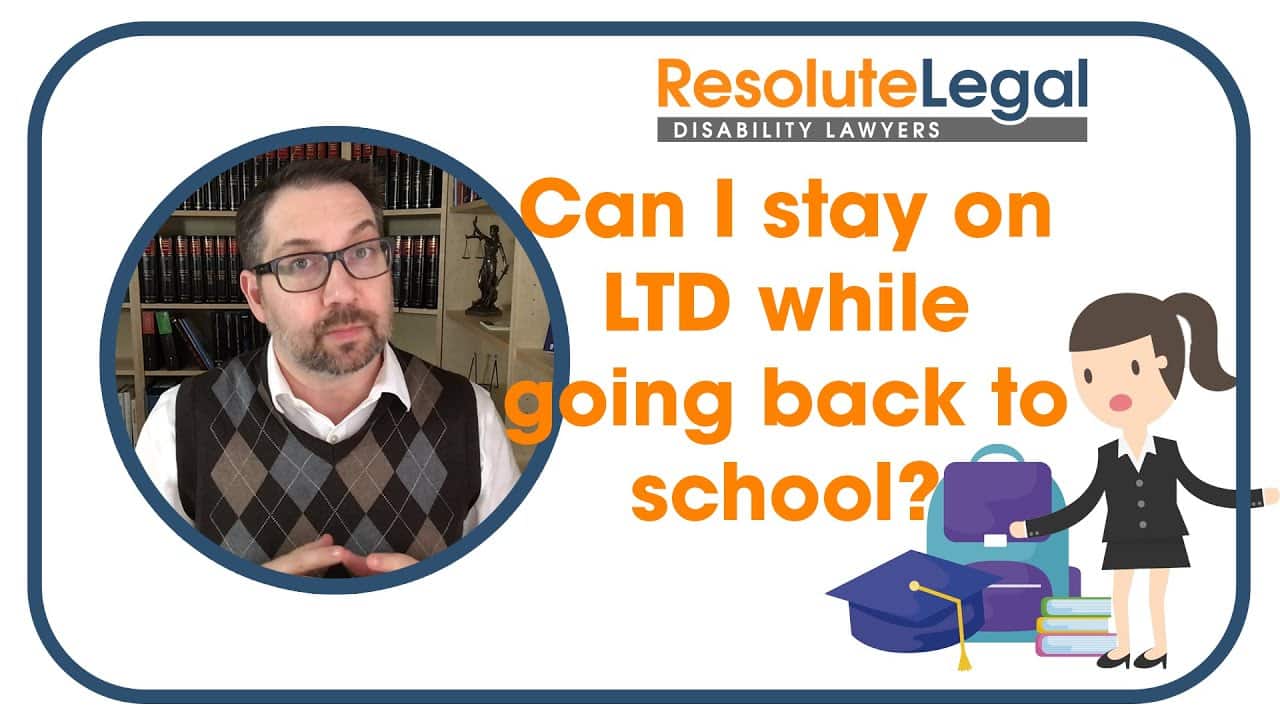Many people come to us and ask if they can take a course or attend school while on long-term disability. Seems like a good idea, right? You don’t plan on staying on long-term disability forever, so you might as well boost your education or work towards your dream job in the interim. However, as we will explain in this article, you need to tread very carefully in these types of situations.
Why is that?
Well, insurance companies are very sensitive about claimants going back to school while on long-term disability. To be frank, they flat-out don’t like it. Insurance companies only insure you for your capacity to work. And when they see people going back to school and taking courses, depending on how in-depth it is, they may infer that if you are healthy enough to attend school, then you are healthy enough to go back to work. Many insurance policies also have clauses that prohibit you from doing any type of work, including taking educational programs or courses. Failure to comply can be a reason to cut off benefits.
Remember, insurance companies don’t care about helping you get a better job. They just want you to get a job so they don’t have to pay you. Insurers aren’t in the business of making your dreams come true.
With all that considered, what should you do if you are dead set on going back to school, regardless of what the insurance company may infer?
Three Steps You Need to Take Before Attending School While on Long-Term Disability
Before you sign up for any course or program, you absolutely need to notify your LTD insurer. Eventually, they will find out, so it’s better that this information comes from you.
The next thing you will want to do is to work with the insurance company to get a rehabilitation plan in place. Let them know that taking this course is part of your plan to get back to work. And explain how taking a course will expedite or improve your ability to find gainful employment. At this stage, we also recommend asking your insurer to assign a rehabilitation coordinator to your case. They can help you come up with a viable plan and potentially may be able to support your argument for taking a course.
The last thing you will want to do is prepare yourself for a no. Most insurance companies won’t support you going back to school while on LTD. You should also be ready for a denial. Insurers will use your willingness to go back to school to cut off your existing claim. Contact a disability lawyer immediately if this is the case.
Our lawyers at Resolute Legal have over ten years of experience dealing with cases like this. Call (888) 480-9050 or click on the button below to schedule your free consultation.
Now that you know how to approach the insurer about attending school, let’s talk about whether they will pay for it.
Will LTD Insurers Pay for my Schooling?
In some cases, long-term disability insurers will contribute towards your schooling, but this is extremely rare. You should not sign up for any courses based on the expectation that they will.
In our experience, insurance companies are more likely to give the green light in the following situations:
- The course is short and inexpensive. For example, a small Microsoft 365 course.
- You need to be retrained in order to work again, and the insurance company has identified that you have no transferable skills. For example, you worked in a labour-intensive job, but your disability prevents you from ever doing that type of work again. Thus, you need to be retrained to work in a new position.
- Your monthly benefit amount is extremely high (e.g., 8,000 plus), and the only way to get you back to work is by doing a course or schooling.
- Note: insurance companies will really only consider paying for small courses, not university or college programs.
Why won’t insurance companies pay for schooling fees while on LTD?
Other programs, such as CPP disability and workers’ compensation, are more willing to pay for schooling. However, there is an almost zero percent chance that an insurance company will. This is because insurance companies will pay for you to undergo a transferable skills analysis, which is a set of tests to determine what positions you may fill if your previous position no longer exists. Once that’s done, they can illustrate that you can work in other occupations, and then they can either deny your claim or refuse to pay for your education.
The only scenario where they may lend financial support is when the course is short and inexpensive, and necessary for your return to work plan.
Insurance companies are much less likely to contribute when programs or courses are expensive, demanding, or time-consuming. For example, they would never pay for someone to go to law school — we did get this question once. Law school is much too rigorous. Plus it’s long and expensive. The insurer could easily argue that if you are able to attend law school, then you are able to go back to work. They also won’t pay for you to take any college or university program. In reality, insurance companies will really only consider paying for short courses.
Final Thoughts
Overall, you should never go back to school without first notifying the insurance company. If they find out, they will just cut you off immediately. So, it’s vital that you keep them in the loop. Additionally, insurance companies are much more likely to support you if you are taking short, inexpensive courses or if you can prove that you need to take the course in order to get back into the workforce.
If you have any questions about this article or need legal support, contact us for a free consultation.
Free Book
Want to learn the secrets to winning long-term disability benefits? Download a free copy of our book.



